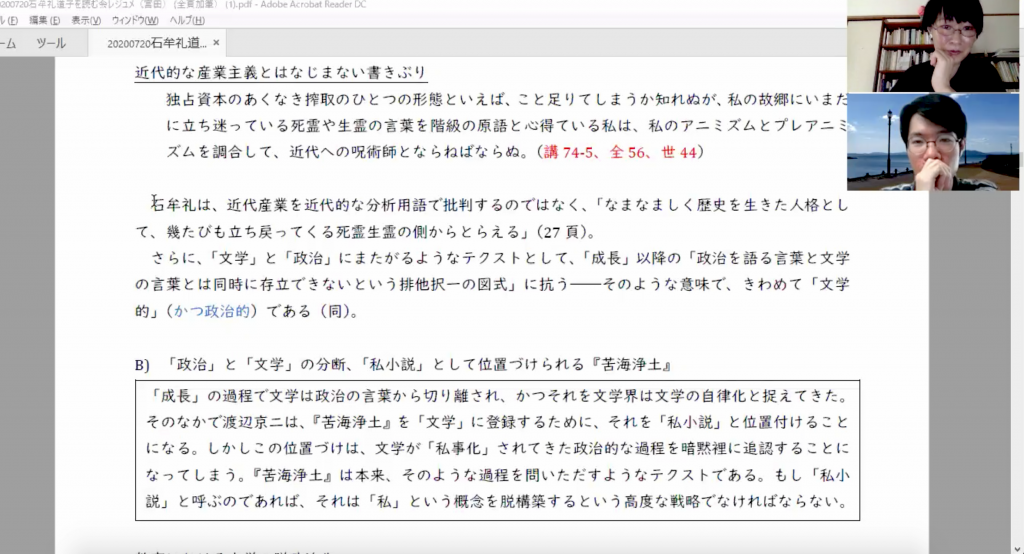The Third Michiko Ishimure Reading Group was held via Zoom on July 20, 2020 at 3 p.m. The presenter was Akihiro Miyata (The University of Tokyo). Tsuyoshi Ishii (The University of Tokyo), Masahisa Suzuki (The University of Tokyo), Shiho Maeshima (The University of Tokyo), Ching-yuen Cheung (The University of Tokyo), Yusuke Yamada (Daito Bunka University), Mizuki Uno (The University of Tokyo), Ryohei Tatebe (The University of Tokyo), and Hanako Takayama (The University of Tokyo) participated in this session. Akihiro Miyata chose the three supplemental articles listed below.
・佐藤泉(2013)「『苦海浄土』のさまざまな「栄耀栄華」:「聞き書」の主体とはだれであるのか」『敍説Ⅲ』09.
・早川敦子(2019)「越境する「命」の神話:石牟礼道子と翻訳の不/可能性」『津田塾大学紀要』第51号.
・水溜真由美(2005)「石牟礼道子と水俣:ゆらぐ〈共同体〉像」北田暁大、野上元、水溜真由美編『カルチュラル・ポリティクス 1960/70』せりか書房.
First, carefully reading Sato’s article, Akihiro articulated key aspects of Kugai Jodo, Paradise in the Sea of Sorrow. Notably, the novel itself is written from a viewpoint alien to that which values economic growth. Furthermore, Kyoji Watanabe has called Kugai Jodo an I-novel because of its discussion of politics and literature at that time, and in this way it promoted the reconsideration of the concept of personal I. Additionally, both the collective activities of the Circle-mura and kikigaki itself were enabled by the inseparable act of listening and talking. Following this, we discussed the effect of modern journalism, which resulted in the separation of reportage and literature, as well as the exclusion of Chinese Classical Literature from the mainstream of Japanese literature. These two changes led to the new conception of ‘We’ based on the birth of fictional text in journalism such as that found in newspapers. We also discussed the simultaneous reception of Ishimure’s works with worldwide attention to Asian and African literature at that time: the question of community in Ishimure should not be reduced to Japanese homogeneity. The impossibility of the depoliticization of literature and the relevance to the glocal, such as an economic community beyond nation were also noted.

Thereafter, based on Hayakawa’s paper, Akihiro introduced some examples of English translations of Ishimure’s work. Then, he pointed out that the characteristics of the Minamata community are mercurial and cannot be described by binary concepts such as center / periphery or city / nature.
One of the important questions posed in his presentation was that regarding the identity of the narrative subject in Kugai Jodo. Since Akihiro specializes in philosophy, especially Heidegger and Watsuji, we tried to reconsider the notions of subjectivity, inter-subjectivity, community, or fudo.
This was the last session in which we read the first part of Kugai Jodo. It was a good occasion to once again discuss the structure of repetition of kikigaki and the impossibility of translation.
Hanako Takayama (EAA Project Assistant Professor)








